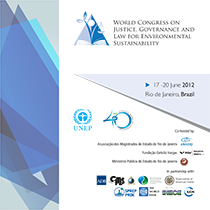Rio+20 and the World Congress of Chief Justices, Attorneys General and Auditors General
Rio+20 and the World Congress of Chief Justices, Attorneys General and Auditors General
Despite many international conferences and important developments in environmental policy, law and governance, only insufficient progress has been made towards achieving many of the internationally agreed environmental goals, targets and objectives. Indeed, in implementing environmental law, including Multilateral Environmental Agreements, States have encountered many challenges in their quest for sustainable development and in improving the overall state of the global environment. The effective implementation of environmental laws requires the informed participation of key decision-makers to not only shape the interpretation and enforcement of these instruments within their jurisdictions, but also to develop institutional frameworks and regulations focusing on environmental governance and accountability issues as well as the role of law in protecting natural resources and promoting sustainable development. The overall aim of the World Congress is to foster a common vision and principles among key stakeholders on how to transform discussions into action and how to use justice, law and governance to promote sustainable development through the outcomes of Rio +20 and beyond. Thus, the World Congress will directly contribute to the Rio+20 Conference by focusing on the legal underpinnings of the themes of the ‘Institutional Framework for Sustainable Development’ and ‘Green Economy in the context of sustainable development and poverty eradication’. It will outline the future actions required by national and international legal stakeholders to promote sustainable development in the 21st century founded on the rule of law and effective governance. The World Congress on Justice, Governance and Law for Environmental Sustainability is expected to:1. Promoting the further evolution of international and national environmental law, including the fundamental principles underpinning them as well as their effective implementation and enforcement;2. Promoting effective national and international environmental governance;3. Strengthening the nexus between social justice and environmental sustainability;4. Providing a global platform that institutionalizes the engagement and cooperation of key players at a national level including judges, prosecutors, auditors as well as parliamentarians with the support of intergovernmental institutions and processes.
